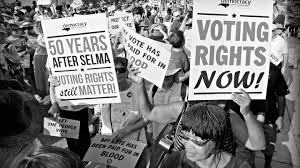

Black suffrage under the conditions of white supremacy has been an issue in the U.S. Africans and other peoples were traded for capital, to harvest and process mainly cotton, rice and sugar cane in the Southern states for profit. Slavery system profits were so extremely large that the Civil War was fought over the many states seceding from the Union to preserve the right to own and profit from human labor.
Georgia was unique initially, as in 1735, two years after the first white settlers arrived, the state House of Commons passed legislation prohibiting slavery in Georgia in response to Spanish-controlled Florida offering slaves freedom in exchange for military service. (“Slavery in Colonial Georgia,” georgiaencyclopedia.org)
However, slavery was demanded in Georgia by a band of settlers, including Patrick Tailfer and Thomas Stephens, who led campaigns to force the trustees to bend to their will so settlers wouldn’t have to do the work of clearing the land of forests and the brutal removal of Indigenous Nations.
Lifting of the trustees’ ban opened the way for Carolina planters to expand their slave-based rice economy into the Georgia Low Country. The planters flooded into Georgia with their slaves and soon dominated the colony’s government. In 1755, they replaced the slave code agreed to by the trustees with one virtually identical to South Carolina’s. This code was amended in 1765 and again in 1770.
By the 1880s, as federal intervention diminished after the Civil War, most Southern states prevented Black men from voting by using a combination of laws and violence, most notably lynchings. On Easter Sunday, 1873, more than 100 Black men were gunned down in Grant Parish, La., for daring to assert their right to vote. (“Reconstruction and Black Suffrage: Losing the Vote in Reese and Cruikshank” by Robert M. Goldman, 2001)
Most Black people in the South only regained real access to the polls in 1965, when Congress passed the Voting Rights Act. This act is generally considered the end of the Jim Crow era, along with the Civil Rights Act of 1964 that legally ended segregation.
The 15th Amendment to the U.S. Constitution, passed in 1870, said: “The right of citizens [males] of the United States to vote shall not be denied or abridged by the United States or by any State on account of race, color, or previous condition of servitude.”
The amendment went on to state: “The Congress shall have power to enforce this article by appropriate legislation.” (History.com)
However, many states such as Georgia and North Carolina still have an abundance of racially charged laws to keep the Black vote low or nonexistent. North Carolina just voted in a constitutional amendment that requires showing ID to vote. It is still unclear as to which form of ID would be needed, but these types of measures are enacted to deter Black, immigrant and working-class voters.
The tactics change, but the message is abundantly clear: Voter suppression of Black people will continue to be steeped in white supremacy.
Black people’s right to vote has been hindered by voter purges, property tests, grandfather clauses, all-white primaries, disenfranchised incarcerated felons and poll taxes. However, a Florida referendum passed in this election restores future voting rights of 1.5 million convicted felons. Although the majority of them were not Black, the law disproportionately affects mostly Black people’s right to vote.
May 19, 2025, will mark the 135th birthday of the great Vietnamese leader Ho Chi…
Philadelphia Honoring the 11 people murdered by the state when they dropped a bomb on…
The centennial of the birth of Malcolm X, also known as El-Hajj Malik El-Shabazz, is…
On May 11, which was Mother’s Day this year in the U.S. and several other…
Philadelphia On Mother’s Day 2025, May 11, Families for Ceasefire Philly and over 20 local…
North Philly Peace Park gathering After a federal court hearing on an anti-immigration bill early…